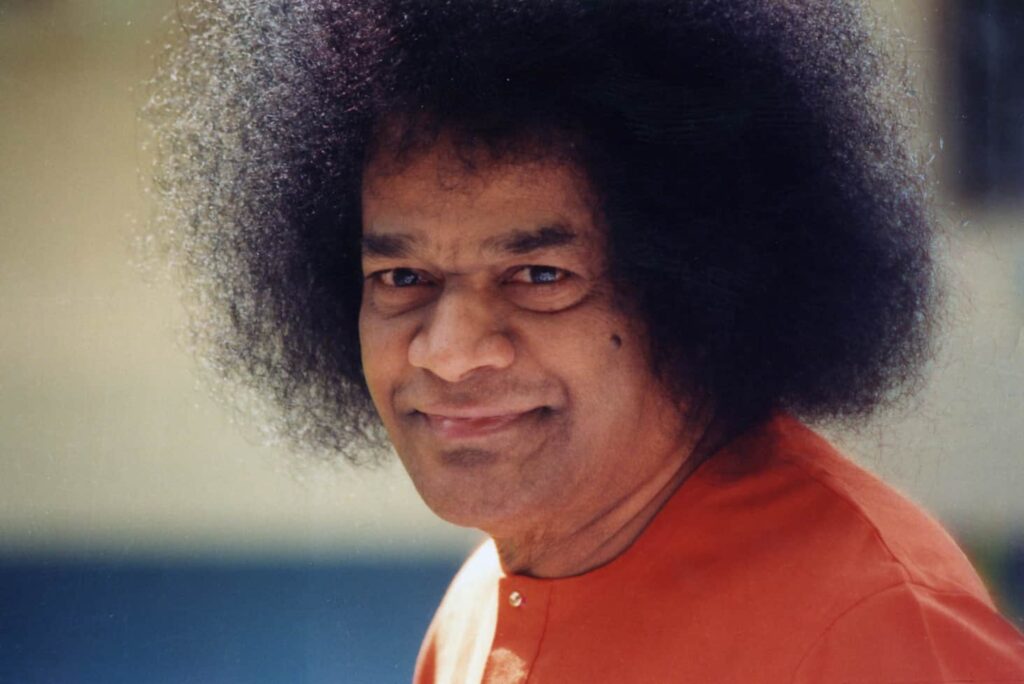
“The scientific knowledge we acquire today must be used for the benefit of the fellowmen. Unless the results of the research are applied in practice, it will be an expensive futility.”
Sri Sathya Sai Baba
Revered Founder Chancellor, SSSIHL
Acquiring degrees and begging for jobs is a pitiable situation.
Develop self reliance and build your life on faith in God.
Students! Teachers! Educationists! Those eager to promote Education! Undigested food brings about illness in the body; similarly undigested knowledge imparted by the present-day educational system has brought several illnesses in the social organism and the body politic.
The disease is promoting contrary feelings that are expressed in mutual conflicts. The educated are reacting with envious emotions towards those who have secured jobs; when they are unable to get jobs, they impute motives of nepotism, etc. and develop resentment, anger, and hatred. The system of education is the root cause of the prevalent discontent and resentment. In the past, western rulers of this country established a system of education which can produce suitable men for the jobs they could provide for the natives. Today, since we continue the same system, we have to create suitable jobs for the people who are educated on the old lines. This is a strange reversal of the role.
It is clear that the agitations, anxieties, fears and frenzies that disturb the country are traceable to education as it prevails today.
Sri Sathya Sai Baba, Sri Sathya Sai Speaks, Vol 15 (1981 – 82)
08 March 1981
Interpreting Entrepreneurship at SSSIHL
(Reproduction of a previous publication at SSSIHL)
Bhagawan Sri Sathya Sai Baba has consistently provided guidance to enhance our lives, infuse purpose and meaning into our existence, and evolve into exemplary “Uttama-purushulu” (noble and high-minded men and women)1 emerging from His educational institutions. Although the concept of entrepreneurship may not be explicitly addressed in His teachings, a closer examination allows us to discern how His words can contribute to our excellence in this role.
Why is it important to focus on a skill like entrepreneurship at this university?
Swami highlights the principal aim of education is to enable students to “shape their careers by their own efforts, standing on their own feet and relying on their own strength” as against the dominant trend where they “become degree holders going around begging for jobs”. This is at the core of the attempt to understanding “the knowledge and the skill” that can be called entrepreneurship and seen as a pathway to achieving self-reliance.
One of the principal aims of education must be to make students self-reliant2. Education must award self-confidence, the courage to depend on one’s own strength.3
He wants us to think beyond the road that leads to “employment exchanges” and “wasting…life in despair and distress”:
What are you planning to do after you obtain the Degree from the University? It is no use going in search of a job from office to office with your degree certificate or registering your name in the employment exchange.4 The pity is, as soon as one secures a degree, he registers his name in the Employment Exchange and thereafter year in and year out, walks up and down that place, wasting his life in despair and distress.
And distinguish the values based “Bhaaratheeya” Education which “emphasize(s) self-reliance and independent living”:
Indian (Bhaaratheeya) education should ideally emphasize self-reliance and independent living. It should confer on the student the courage to stand up against injustice, indiscipline, immorality and falsehood. It should grant steady faith in the Aathman (divinity) as the reality of man.6 Bhaarath had unique goals for education in the past. You must relearn them and revive them. Vidhya, it was understood, caused splendour to emerge from the heart.
Vidhya implied dedication for mutual service…Your education must make you self-reliant and self-confident.7
This is the aim; self-reliance and independence that confers on us “courage to stand up against injustice, indiscipline, immorality and falsehood”.
Why self-reliance?
We may then ask why self-reliance? Swami reminds us that excessive focus on “monetary returns” and possibly related “dependence on others” for employment and opportunities creates “narrow loyalties and limited vision” to achieve our potential as agents of change.
Monetary return should not be the aim.8 The students of this land should not waste their lives in seeking material comfort.9 So long as you are caught in the coils of monetary considerations and so long as you think that such benefit alone can make you happy, you will continue to be as you are.10 Dependence on others should be avoided. Self-reliance is the most desirable virtue. One should always have the future of one’s country in view and mould oneself into an ideal for others… Narrow loyalties and limited visions inhibit student minds at the present time.11 …people should develop self-reliance. They should not look to others or to the Government to do what they can do for themselves. You must do as much as possible to help yourself and enjoy the fruits of your labours.12
Do not lean upon others; lean on your own strength and skill. Live on your own earnings, your own resources. Self-reliance is the best food for growing young men. It is best to live with honour for just a day than with dishonour for many decades; better a short lived hamsa (swan) than a century-lived crow…Do not crave for the property of others or for things that can be got by trickery or dishonourable means. Earn by the sweat of your brow, then, you can be proud and happy, when you spend it.13
How to develop self-reliance?
What everyone has to learn today is how to be self-reliant and not depend on others. How is one to be self-reliant? By developing Aathma-Vishvaasa (Self-confidence). People have to develop Self-confidence. They must adhere to Truth and Righteousness.14
God is the basis for all that exists. Rely on God rather than on things which are dependent on God. Develop self-reliance on the basis of faith in God.15 …implant in the children self-reliance by encouraging them to believe in themselves. Let them not develop a desire for imitating the vanity of others.16
Where should one look for opportunities to practice innovation and entrepreneurship?
From My earliest years I have been concerned about providing three primary requisites for our people: Free education, free medical aid and free basic amenities like drinking water Education is for the head. Medical care is for the heart and pure water for the body. These three cover the main requirements of life. To provide these three gives the greatest gratification.17 Try to provide free education wherever you can. Provide free medicines and treatment for the poor. Co-operate among yourselves, as far as possible to provide drinking water. Go to the villages and serve the poor and the downtrodden…There is no greater occupation than service to society. Become leaders through service.18
Service to society and the nation must dominate your thought, word and action.19 Fill your hearts with the resolve to promote the welfare of the nation. “Sarva loka hithe rathaah”
(Rejoicing in the well-being of the entire world).20 Do not succumb to selfishness and careerism. Dedicate your lives to the well-being of the world and the promotion of world peace.21
One must be eager to serve others, not eager to be served by them
End Notes
- Sathya Sai Speaks Vol. 25 Chapter 37, Convocation – SSSIHL, 22-11-1992
- Sathya Sai Speaks Vol 20 Chapter 03, Muddenahalli Campus on 8-2-1987
- Sathya Sai Speaks Vol 15 Chapter 34, Vidyagiri, 22-11-1982
- Sathya Sai Speaks Vol. 27 Chapter 30, Convocation-SSSIHL 22- 11-1994
- Sathya Sai Speaks Vol. 15 Chapter 34, Vidyagiri, 22-11-1982
- Sathya Sai Speaks Vol. 14 Chapter 6, Teachers’ Training Camp, Brindavan, 25-7-1978
- Sathya Sai Speaks Vol 15 Chapter 34, Vidyagiri, 22-11-1982
- Sathya Sai Speaks Vol. 15 Chapter 34, Vidyagiri, 22-11-1982
- Sathya Sai Speaks Vol. 14 Chapter 6, Teachers’ Training Camp, Brindavan, 25-7-1978
- Sathya Sai Speaks Vol. 14 Chapter 6, Teachers’ Training Camp, Brindavan, 25-7-1978
- Sathya Sai Speaks Vol. 15 Chapter 34, Vidyagiri, 22-11-1982
- Sathya Sai Speaks Vol. 30 Chapter 29, Sai Kulvanth Hall 11-10-1997
- Sathya Sai Speaks Vol. 12 Chapter 14, Hyderabad April, 1973
- Sathya Sai Speaks Vol. 30 Chapter 5, Poornachandra Auditorium, 13-2-1997
- Sathya Sai Speaks Vol. 30 Chapter 5, Poornachandra Auditorium, 13-2-1997
- Sathya Sai Speaks Vol. 17 Chapter 31, Prasanthi Nilayam, 31-12-1984
- Sathya Sai Speaks Vol. 30 Chapter 29 , Sai Kulvanth Hall 11-10-1997
- Sathya Sai Speaks Vol. 25 Chapter 37, Convocation – SSSIHL, 22-11-1992
- Sathya Sai Speaks Vol. 27 Chapter 30, Convocation-SSSIHL 22- 11-1994
- Sathya Sai Speaks Vol. 25 Chapter 13, Brindavan, 21-05-1992
- Sathya Sai Speaks Vol. 25 Chapter 13, Brindavan, 21-05-1992
